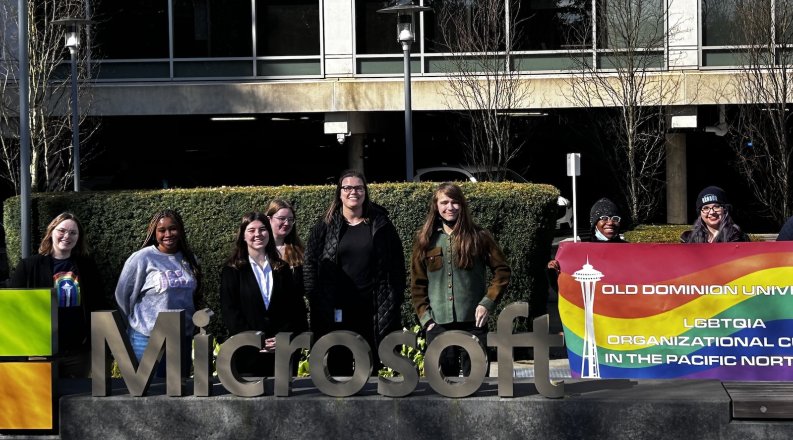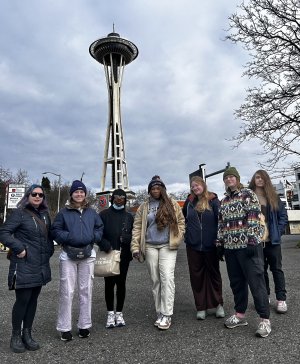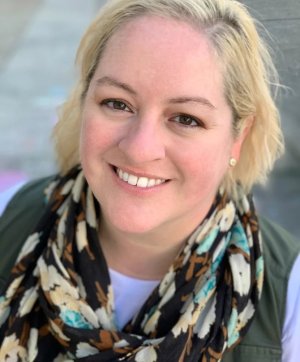By Sam McDonald
Nothing helps you understand your hometown — and yourself — like spending time far, far away.
Just ask six Old Dominion University students who explored Seattle for a week this spring as part of an innovative, immersive learning experience combining virtual classes with boots-on-the-ground tours, interviews and conversations.
Through a faculty-led “study away” program, students took a semester-long, three-credit course that culminated in a short travel component. After returning, they analyzed their findings, and collaborated on an ePortfolio that distilled what they learned.
“This was my first study away program and I was surprised at how much I loved it,” said Norfolk native Riley Cunningham. First-hand experiences deepened understanding, Cunningham said. For example, the Old Dominion students visited a Seattle news television station and spoke with staff members about race and gender representation in the media.
“We could read about it in a book all we wanted, but actually meeting with people there and engaging with classmates about it, that was amazing,” said Cunningham, who is a Women and Gender Studies and Psychology double major.
“I would do it again in a heartbeat, and I would recommend it to anyone.”
The course, titled “LGBTQ+ Organizational Culture in the Pacific Northwest,” was taught by Alison Lietzenmayer with assistance from Carla Harrell and Megan Mize.
While the group’s Seattle itinerary included tourist spots like Pike Place Market and the Space Needle, most of the visit focused on places related to the course’s purpose — examining organizational communication through a critical cultural studies lens in relation to queer communities.
Stops included the Microsoft corporate headquarters; the Wing Luke Museum, which documents the cultures of Asian Americans, Native Hawaiians, and Pacific Islanders; and the Pioneer Square neighborhood, where the group took a guided walking tour of queer history sites.
“Our course seeks to examine and critically analyze the ways in which major tech companies support and celebrate LGBTQ+ culture within a larger organizational culture,” explained a course description. “We aim to understand the organizational policies and gendered communication in these spaces to promote equity and radical inclusivity.”
Quinn Summers, a sophomore journalism major, created a podcast-like audio recording documenting reactions and observations from Seattle.
Summers was particularly affected by the newsroom visit. NBC affiliate KING-TV, Channel 5, invests resources in covering the Seattle region’s diverse communities. It airs regular “Facing Race” segments to highlight social issues.
Roberta Romero, executive producer for “Facing Race,” told the ODU students that news reporters often underestimate the ripple effects of their coverage, Summers recalled.
“It’s important to consider the implications of the work organizations do with the LGBTQ community,” Summers said in the audio journal. “That’s part of diversity — thinking about the impact of our actions on the diverse communities we interact with.”
The Seattle experience was meaningful in ways not directly related to the coursework, too.
“Being around a number of trans people at once for the first time in my life was genuinely life changing,” Summers said. “Inside or outside the assignment, it’s absolutely true.”
Lietzenmayer, a master lecturer who teaches at ODU remotely from her home in Seattle, conceived and launched the Seattle study away program in 2022. The 2024 version was its second offering.
A Seattle resident for 10 years, Lietzenmayer eagerly shares insights about the local community. “Supporting LGBT advocacy work and community building is really important to me,” she said.
In addition to teaching, Lietzenmayer works as ODU’s director of Senior Experience and internships for the Department of Communication and Theatre Arts, and as director of faculty development for the new Monarch Humanities Internship Academy.
She’s seen the power that can be unleashed when learning expands beyond the classroom.
“To me, it’s really important to meet people where they are,” she said, noting that study abroad is prohibitively expensive for some students. “Traveling to the West Coast can be just as much of a culture shock as going to another country. I enjoy using the resources I have access to and sharing them with others.”
Course leader Carla Harrell traveled with the 2022 and 2024 course programs, and offered expertise in gender and interpersonal communication as a Master Lecturer for the Department of Communication and Theatre Arts.
“The entire study away experience offers growth for the participants from how to navigate travel, to negotiating different cultural norms, and of course the education that comes with immersing oneself in the topics the course covers,” Harrell shared.
Another of the course’s leaders, Megan Mize, runs ePortfolio and digital initiatives for Old Dominion’s Academic Success Center.
“Exploring LGBTQ+ organizational culture in Seattle was an immersive journey that transcended textbook knowledge,” Mize wrote. “Walking alongside students as they interacted with policy influencers and community advocates highlighted the transformative potential of education in action.”
Study away student Wynter Fayson was offered a job at IBM after returning from the Pacific Northwest experience. Fayson graduated this spring with a Psychology degree with a double minor in Management and Communication.
Confidence built up by visiting Microsoft’s headquarters and talking to professionals there, Lietzenmayer said, made Fayson’s job interview easier. “She could say, ‘I do belong here. I know how to do this.’ And she nailed it.”





